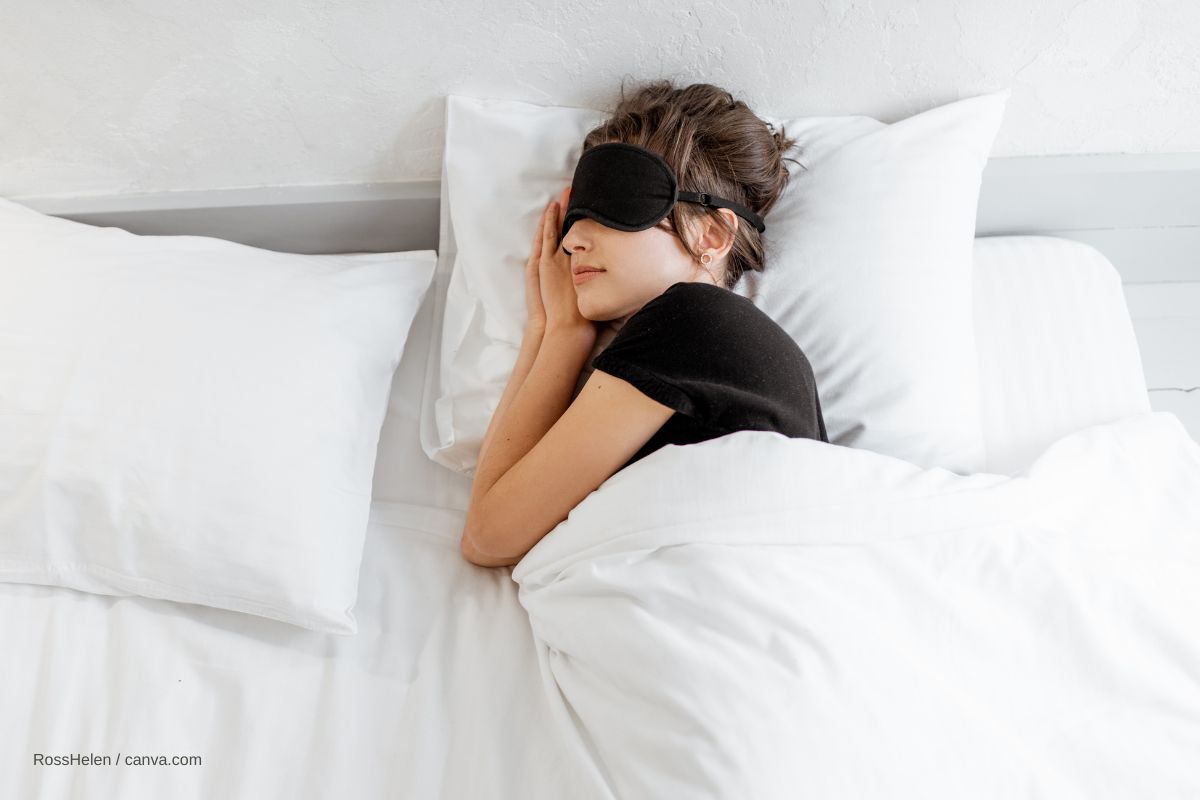Slim While You Sleep – Reality or Myth?

Becoming slim while you sleep, wouldn't that be a dream? A few cookies with your coffee, snacks during movie night, and then eating cake on the weekend without putting on weight ... sometimes sticking to a healthy diet and keeping your waistline becomes difficult in everyday life. And after a hard day's work, you often don't have the time or motivation to exercise in the evening. What if you didn't need to go to the gym and could eat your fill without feeling guilty? What if all the pounds from the day before disappeared overnight? Wouldn't that be ideal!? But is this possible? Can we actually just lose weight in our sleep? Find out what's behind the "slim while you sleep" myth.
What goes on in our body at night?
Who hasn't dreamed of eating whatever you want every day without gaining a single gram, let alone a kilo? Whether it's carbs, fat, or protein, not having to worry about doing enough sport and exercise, burning fat, or restrictive eating. How nice it would be to simply eat what you feel like eating and never have to diet again! It would also save you a lot of time and worry. But can you really lose weight while you sleep?

Being able to lose weight overnight is not magic but can actually be explained quite logically. Most of the pounds lost overnight are water. This can easily add up to 0.5 liters! But apart from the number on the scales, our body also feels different after getting up, fresher and almost youthful. This is due to the regeneration metabolism. The body needs time and rest for this, which is why the process takes place overnight. At night, the body does not have to divide up its energy and can concentrate fully on the metabolic processes. Fat serves primarily as a source of energy here. A quiet, restful night is therefore essential to "repair" the body and also promote fat burning, lymphatic drainage, and the tightening of connective tissue. Quite a lot of benefits that sufficient sleep brings, right? So perhaps instead of calling it "slim while you sleep", we should call it "beautiful while you sleep"! 😉
The “slim while you sleep” concept by Dr Detlef Pape
Although we lose some weight overnight, we quickly make up for the lost calories during the day, meaning the number on the scale at the end of the day is higher than it was in the morning. However, Detlef Pape, who is regarded as the brain behind the "slim while you sleep" principle, argues that it is in fact possible to lose weight while you sleep.
Behind the pleasant-sounding method of the "slim while you sleep" diet is a nutrition plan that involves insulin-restricted eating. The concept for burning fat involves a certain composition of nutrients on the one hand and adapting meals to the human biorhythm on the other. The aim is to keep insulin levels low over time. Why? Because insulin blocks the burning of fat, we want to keep the release of this substance as low as possible. Many people may be pleased to hear that this insulin-restricted diet does not require a strict avoidance of sweets, as is the case with many other diets. Instead, a balanced diet and a longer break between meals are the keys to success. So far, so good, but what does this mean in specific terms for your diet?
It all depends on the right ratio of nutrients

Insulin is increasingly released when carbohydrates are combined with animal proteins. In other words, these two nutrients must be separated from each other to counteract insulin production and thus stimulate the burning of fat. A day according to Dr Pape's "slim while you sleep" nutritional concept could look like this: For breakfast in the morning, plenty of carbohydrates should be consumed, for example in the form of bread or rolls with honey or jam. At lunchtime there are no restrictions, both carbohydrate and protein-rich foods are allowed. At dinner, it is important to prepare the body to burn fat at night and to avoid carbohydrates in the evening. Instead, protein-rich foods such as fish, lean meat or cottage cheese are on the menu. While this type of diet with the separation of carbs and protein might be feasible for some, even though it involves a lot of planning, there are two more catches.
Firstly, insulin is the only hormone that lowers blood sugar and ensures that glucose from the blood reaches the body's cells to supply them with energy. Even if the aim is to burn fat, this process is also important for our body and should not be suppressed too much. Secondly, the insulin-restricted diet requires a five-hour break between meals. This allows the insulin level to drop completely before it rises again with the next meal. Snacks and in-between meals are therefore not permitted, and you are only allowed to eat at the three meals a day. This can be quite a challenge in everyday life!
Slim while you sleep: Is it all a big marketing lie?
The book "Slim while you sleep" by Dr Pape with its concept of the same name caused quite a stir when it was published in 2006. Is it really that easy to succeed in losing weight? Let's be honest, everyone knows that five-hour breaks between meals are unrealistic for most people. Not only would coffee in the afternoon be eliminated, but healthy snacks such as almonds and fruit, which provide us with the energy we need in demanding or stressful situations, would also be taken off the agenda.
Pape's findings are nothing new. He has simply taken the findings of scientists to heart and realized that it is precisely at night that the processes in our bodies can run undisturbed. So, do we need a new diet book to add to the books we have already collected?
Understanding and listening to your body

Diets that promise a lot and usually only leave you with that yo-yo effect in the end are not always necessary. To actually become slim while you sleep, you need to understand your body and its functions. Many important processes take place in the body while we sleep. A sufficiently long sleep can therefore help you lose weight. The metabolism starts just one and a half hours after falling asleep. The longer the sleep phases last, the more time the metabolism has to work; the ideal sleep duration is six to eight hours a day. Rituals and relaxing activities such as reading or listening to music help you fall asleep more easily. If a sleep phase is particularly deep, it is better for the body's regeneration than if we wake up frequently.
Of course, we can't sleep the whole day in hopes of shedding some pounds. Instead, we have a few additional tips. 😉 Sufficient exercise should be integrated into every day to support a healthy lifestyle. It doesn't even have to be a trip to the gym. After all, there are plenty of easy alternatives. Replacing the elevator with the stairs or walking the last few meters to the office instead of taking the car or train can have a big impact in the long run. For early risers, those who want to become morning people or people who simply don't have time in the evening, early morning exercise may also be an alternative. In addition, avoid eating your last meal directly before going to bed. Your body is then busy digesting and can only use part of its energy for the regenerative processes.
Unfortunately, losing weight at night does not work without effort and certainly not overnight. But if we listen to our body, get enough exercise during the day, and make sure we don't go to bed stressed, we can promote restful sleep. And this is important, because it brings us a step closer to our goal of becoming slim while we sleep. 😉
Photo credits:
RossHelen / canva.com
Anton Estrada / canva.com
Iamngakan eka / canva.com
puhhha / GettyImages
